"Therapy Would Destroy Our Band"
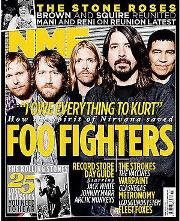
NME
After 16 years on rock's frontline, the pressures of being in one of the biggest bands in the world brought Foo Fighters to the brink. It took recording sessions in his garage and the return of some Nirvana legends for Dave Grohl to embrace his past and move on. NME finds a band reborn.
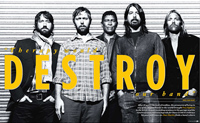 East London's Old Truman Brewery, nightfall. We find ourselves amid a palace of Freddie Mercury bodysuits, vintage NME covers and video installations. This is the launch of the Queen exhibition, Stormtroopers In Stilettos. Among the carnage of 400 London hipsters and an open bar mill Jessie J and Theo Hurts, their eager publicists directing them toward cameras. Roger Taylor, Brian May and Freddie Mercury's mother are received like royalty.
East London's Old Truman Brewery, nightfall. We find ourselves amid a palace of Freddie Mercury bodysuits, vintage NME covers and video installations. This is the launch of the Queen exhibition, Stormtroopers In Stilettos. Among the carnage of 400 London hipsters and an open bar mill Jessie J and Theo Hurts, their eager publicists directing them toward cameras. Roger Taylor, Brian May and Freddie Mercury's mother are received like royalty.
Just about the only people paying actual attention to the exhibits are Foo Fighters. Having been ensconced in their entourage for days now, we proffer The Grohl a game of Would You Rather?
So, Dave, would you rather be the new singer in Queen or the new drummer in Led Zeppelin? He fixes us with a now-familiar toothy look that says 'Don't Mess' as much as 'I'm The Nicest Guy In Rockô'.
"Well, I think George Michael should be the new singer in Queen... and the new drummer in Led Zeppelin is Jason Bonham!"
NME is thoroughly bested.
"Are you a Queen fan?" he asks.
Well, as much as the next guy when there's an open bar, but not like you, we reply.
"Oh, I'm not the biggest Queen fan in this band. That's those two." He gestures toward the Southern Californian Foo Fighters contingent, Pat Smear and Taylor Hawkins. Well, it figures.
"Oh my gaaaaaaaaad!" squeals Pat. "Me and Taylor are constantly fighting about who's the bigger Queen fan. Taylor goes a little deeper, but I celebrate the entire career, so I think it's a wash!"
"Well, Pat gets to say he's liked Queen the longest. But I love anything that's bringing back the old days of Queen, because people forget that Queen were this crazy art rock prog crazy long hair and tights band. Only from England could Queen come!"
Chris Shiflett, the affable everydude guitarist, rolls his eyes to the heavens as the spat escalates.
"Are you kidding me? Those two talk about 'A Night At The Opera' like it came out last fucking week."
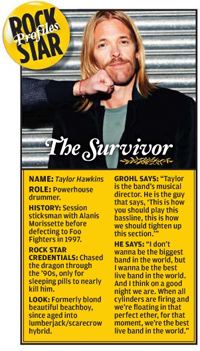
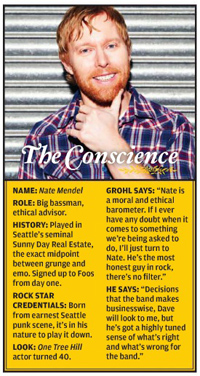 Oh yes, NME has gone native, deep in the Foo Fighters' entourage in all their bickering glory. Because they like to take over a country when they visit it, we spend a mammoth week in their company in London - at the Queen party, at their film screening, at the Shockwaves NME Awards, at the Wembley Arena NME Big Gig, and finally at their incendiary secret Dingwalls show as White Limo. We will learn that they're not the Grohl dictatorship of legend, but five real people with their own strange ways. By the end we'll also discover that life on Team Foo is different to what anyone thought. But first, a little context...
Oh yes, NME has gone native, deep in the Foo Fighters' entourage in all their bickering glory. Because they like to take over a country when they visit it, we spend a mammoth week in their company in London - at the Queen party, at their film screening, at the Shockwaves NME Awards, at the Wembley Arena NME Big Gig, and finally at their incendiary secret Dingwalls show as White Limo. We will learn that they're not the Grohl dictatorship of legend, but five real people with their own strange ways. By the end we'll also discover that life on Team Foo is different to what anyone thought. But first, a little context...
The new one is great so it's fine, but there's no getting away from the fact that Foo Fighters hadn't made a really good record in a long time. Sure, there have been songs like 'The Pretender' and 'In Your Honor". But somewhere along the way, as the venues got bigger, the choruses seemed to ring a little hollower, the albums more generic, as if the band had become an experiment in scale at any cost. When we settle down with Dave in his hotel room and posit this theory in not quite so many words, he as good as agrees.
"Well, making the record in the garage to tape with Butch Vig was really meant to counter what the band had become. Like, 15 years ago nobody called us a rock band. We were alternative, or grunge or something. And it's funny, we have sort of become something that we weren't. We can't fly the Gilman Street punk flag because we do things like travel in private planes and we make a lot of money playing shows. We do things that most big rock bands do. But it's important that we do it all... tastefully. Our world is really simple and I don't ever want to see it get out control. That's why after the last round of touring I took the break, because I felt like it had the potential to go there. It's funny because for the longest time never looked at touring as a profitable thing. We lost money on every tour we'd been on for fucking 12 years. But I didn't care, I just wanted to play and most of the time I didn't even know about it, so it was fine. Then I got suspicious because everybody wanted us to tour more, tour more, tour more. And I realised, 'Wait a minute, other people are doing this for money? Really? How weird.' We were never like that. That was never part of the intention."
Your last two records were, be honest, not your best.
"Well, you know, we had to make those records to make this record. We had to make the double album with the rock and the acoustic. And we had to make the last album, which was a combination of those things, because creatively, I don't want to become a cartoon character. I don't want to paint myself into a corner where I have to do that one thing that people know of me. I don't want to have to strut out there in my fucking costume and play the new songs which sound just like the old songs. Hopefully people see me as a musician, not like a fucking action figure. This album really represents the identity of the band, whereas we've made albums before that sound like we're trying on clothes that don't fit. But we had to know if they fit or not."
Plenty has been made of new album 'Wasting Light' and its back-to-basics construction, made in Dave's home garage, with Butch Vig. Listen to them talk and you'd think they'd done it with Steve Albini in an underground echo chamber. Actually they spent a lot of money building a state-of-the-art studio and made the record as tightly as you'd expect a multi-million-selling rock band returning with their banker record. Taylor, the resident muso, insists that the rejection of Pro Tools is the key to its vivacity. Bassist Nate Mendel, the pragmatist, reckons it's just that the songs are better. Either way, it's a lacerating return to form, a full-throttle, diesel-powered beast of a thing, heavier, crunchier and pumping with more soulful testosterone than ever before. Obviously it still sounds like Foo Fighters; anthemic macho stadium punk is what you're always going to get. It's just that this is a better Foo Fighters album than anything they've made since, yes, 'The Colour And The Shape' back in 1997. Dave has clearly thought about this...
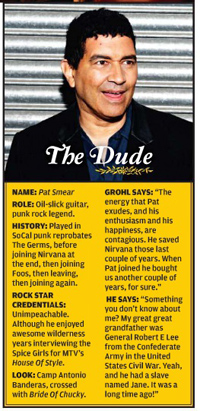
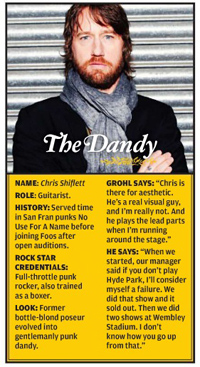 "This album, I don't think anyone can say that 16 years later we've made our best record. Because there's 16 years of albums behind us that people have grown up with or learned to love. I know this is the best Foo Fighters record that we've ever made because I made them all. Most reactions to this album are that it's the best one since 'The Colour And The Shape'. But if I stack the two up next to each other - if 'The Colour And The Shape' were our new record, songs like 'Doll' and 'See You' and 'New Way Home' and 'Wind Up' - those are four songs that people would've said, 'Yeah, I can see where they're going but they're just not the strongest things they've ever done.' But because they were 14 years ago with other songs like 'My Hero' and'Everlong' and 'Monkey Wrench' and all that shit, that's considered the record. Whereas this album, there's no filler. That was Butch's prerogative, if it doesn't belong on the record, don't put it on,the record."
"This album, I don't think anyone can say that 16 years later we've made our best record. Because there's 16 years of albums behind us that people have grown up with or learned to love. I know this is the best Foo Fighters record that we've ever made because I made them all. Most reactions to this album are that it's the best one since 'The Colour And The Shape'. But if I stack the two up next to each other - if 'The Colour And The Shape' were our new record, songs like 'Doll' and 'See You' and 'New Way Home' and 'Wind Up' - those are four songs that people would've said, 'Yeah, I can see where they're going but they're just not the strongest things they've ever done.' But because they were 14 years ago with other songs like 'My Hero' and'Everlong' and 'Monkey Wrench' and all that shit, that's considered the record. Whereas this album, there's no filler. That was Butch's prerogative, if it doesn't belong on the record, don't put it on,the record."
There's precedent for all of this. Last time the Foos found themselves in a creative rut, after 1999's 'There Is Nothing Left To Lose', Dave had his affair with Josh Homme in Queens Of The Stone Age, then came back to the marriage with a renewed libido. So when the Foos took their hiatus (during which all the members did their own projects) he did it again, forming Them Crooked Vultures with Josh and John Paul Jones. That must have had a bearing on the album, right?
"Yeah, I think that the Vultures influenced me to not do what the Vultures do. Because the Vultures was the most fun I've ever had playing the drums. It was a real honour to play with an actual Godlike Genius, John Paul Jones. It's probably the most blazing live band I've ever been in. But we had these songs that were six, eight, 12 and 17 minutes live, which were an experience in themselves. I was out there doing that thinking, 'You know, this is not what the Foo Fighters should do. The Foo Fighters need to have an album which is quick and to the point." The feeling that I got playing with Josh and John is one that every musician needs to feel at least once. You're validated by the music - 'This is why I was born!' This is what it's all about. And when you bring that feeling back to a band of friends that you've been close to for so long it becomes an even deeper experience. The same happened when I played with Queens. I honestly felt like I was meant to be in that band for those few months. When it was time to go, it was time for me to go. We'd served each other well, and as Queens do, they shake your hand as you're walking in and they shake your hand as you're walking out."
'Wasting Light' isn't the only new Foo Fighters release this year. Accompanying the album is Back And Forth, a feature-length documentary directed by James Moll,
charting the band's history from the day Kurt Cobain pulled the trigger to when they finished 'Wasting Light'. Aside from some electrifying unseen live footage, it also sees the band tell the whole story in their own words. For an official movie it's lacerating. There's an impression about Foo Fighters, probably because of the drama-party that was Dave's previous band, Nirvana, that their career has been one jolly escapade of life as a vanilla rock star. It's actually surprising to witness the traumas they've endured these past 16 years...
"Um, no - it hasn't all been fun," says Dave. "We've had moments when we didn't want to be a band anymore, we've had moments where we didn't know if we were gonna survive. We've had some great victories and we've had some really lousy shit happen. And when we decided to do the movie - the director James, he's not a music guy. So his focus was the personal relationships and the people. He got us to say things we might not even say to each other. Which I believe is one of the reasons we've managed to stay together, because we just don't tell each other everything. I know that some bands hire therapists to help them sit down and work shit out. That would completely destroy our band. Bands in therapy are doomed. You shouldn't be so open emotionally with your band. From the beginning we wanted to make it clear that this was not like the drama club. We did not want any bullshit." The movie, then, has become their therapy, and nobody comes off completely unscathed.
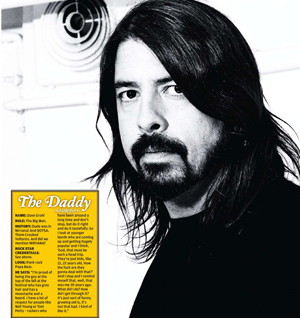 Taylor, who has to be reminded of the time in August 2001 when he overdosed and fell into a coma, actively doesn't want it released. Now a private family man and very much a muso, all he will say is: "That was the boink on the head that said 'Grow up, dude'. And that's when I sort of became a man in a way. I don't know if I'm an adult, but that's when I started taking life seriously and saying, 'OK, I love playing music with these guys and I like living.' Being a fucking drughead jackass seems romantic when you're 17 and saying 'Oh yeah, I'm gonna be like Keith Richards.' But God, there's only one of those."
Taylor, who has to be reminded of the time in August 2001 when he overdosed and fell into a coma, actively doesn't want it released. Now a private family man and very much a muso, all he will say is: "That was the boink on the head that said 'Grow up, dude'. And that's when I sort of became a man in a way. I don't know if I'm an adult, but that's when I started taking life seriously and saying, 'OK, I love playing music with these guys and I like living.' Being a fucking drughead jackass seems romantic when you're 17 and saying 'Oh yeah, I'm gonna be like Keith Richards.' But God, there's only one of those."
Chris, who joined the Foos in 2000, is frank about his initial resentment of Pat coming back. "I was wary of Pat, I think anybody would have been. He almost came back after I'd been in the band a month. And I would've been out at that point, it wasn't like now, I didn't have my footing. So that was my frame of mind: here's this guy who wants my job, and my job is how I feed my children and pay my rent. So my job's important to me for lots of reasons, musically and otherwise."
But perhaps the most shocking moment comes around the making of 'The Colour And The Shape', and Dave going behind original drummer William Goldsmith's back and re-recording the drum parts. It's quite something to see that the Nicest Guy In Rock has it in him to be a bit of a bastard. Goldsmith contributes to the film, but it's clear he remains deeply bitter about it.
"It's hard for me to admit that, yeah I had a problem with anyone else playing drums on my record," says Dave. "That was the first time I made a record that I hadn't played the drums on. So for me it was like letting someone go. It was fucking heavy. But when I watched that footage back, it's a hard thing to admit. I wish I would've done it differently, that's one of my few regrets in Foo Fighters; I wish I would've handled that better."
The consequence of all this looking back is that Dave is finally able to make peace with the past. For years he was prickly when talking about Nirvana. Yet now, Pat's been back in the band five years, Butch Vig has produced the album, and in an ultimate fangasm moment, Krist Novoselic turns up to play bass on the heavier-than-hell 'I Should Have Known", which the film virtually admits is about Kurt. "There was something about the whole project that was asking for that type of retrospection," admits Dave. "We did a couple of songs with Butch for our Greatest Hits record. I love working with Butch, he's a great guy, and when we get together we feel like we did in 1991. So I knew we wanted to do it with Butch and I remember thinking if we're going to do it with Butch then let's do it to tape, because Butch has made some huge records with tape.
And then I thought, rather than do it at our studio maybe we can do it in my garage, where I've done plenty of demos. I like the way garages sound. And then I started thinking about this documentary, but at first I thought, 'Well it'll be two documentaries, and only for hardcore fans because nobody else gives a shit.' We'll make a history of the band with footage that our fans have never seen before. And at the same time we'll film the making of the new record. And someone said, 'Well, why aren't they both the same movie?' Then it came to me that it was all about this full-circle, 20-year story, and there was more than one story. Butch and I meeting 20 years ago, the impact that Nirvana had on our lives, losing Kurt, the reason why I started the Foo Fighters. And all the things that we've done to get us to where we are now. For years I've been trying to establish what I do as what I do, but there's no question that I wouldn't be doing what I'm doing now if it wasn't for Nirvana. So it's this delicate balance. I owe everything to Butch and to Kurt and Krist, but it's important for me to find my own territory. For years it was difficult to talk about, and of course it still hurts if you talk about it too much. But to me it was necessary to have all of those things come to the surface in order to break through with this record. And it was perfectly natural for me to say,' Y'know, this would be such a cool opportunity to get Krist down into the studio.'
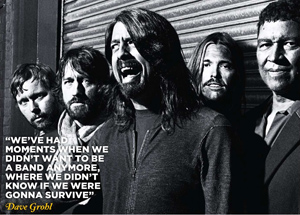 He and Butch and I haven't hung out in the studio for 20 years. And I wasn't even thinking about the music, I was just thinking about the three of us coming together, and maybe without words just acknowledging that we survived, y'know? And that we're men and we're here. 'Wow can you believe it? That actually happened. Look at us now! That's fucking crazy.' You don't even have to say those things, you just know it. And when you're connected by something like Nirvana, all of those things come to mind."
He and Butch and I haven't hung out in the studio for 20 years. And I wasn't even thinking about the music, I was just thinking about the three of us coming together, and maybe without words just acknowledging that we survived, y'know? And that we're men and we're here. 'Wow can you believe it? That actually happened. Look at us now! That's fucking crazy.' You don't even have to say those things, you just know it. And when you're connected by something like Nirvana, all of those things come to mind."
Foo Fighters are the textbook lesson in how to keep your rock band awesome as your hair turns grey. But there's something awry about this down-to-Earth, blue-collar, everydude image. It comes up most explicitly at the end of the film, where Taylor concludes, "People say to me 'You're a rock star', and I'm like, 'Fuck off, I'm a musician!'" You want to shake him and go, "But, you are a rock star, and that is a totally amazing thing to be." So come on Dave, don't you secretly love it?
"Well, I mean, it's nice to be able to pick and choose which pieces of that outfit you're gonna wear. OK, I don't really wanna do the make-up and the supermodels. But I like the stadium! And I don't think I need the fucking blow and the paparazzi, but I like flying around in private jets, those are nice! I'll tell you how it is in the Foo Fighters. One of our favourite things after shows used to be a really nice bottle of champagne, freezing cold. And a bucket of cheap fried chicken. To me that's fucking heaven. And it's exactly what the Foo Fighters are like. We live in this world where we can afford a nice bottle of champagne. But I'd much rather eat this greasy bucket of fried chicken than caviar and shit like that. That's kind of how we roll. But then I got to the point where I thought I'm gonna have a fucking heart attack every time I did it."
Foo Fighters, then. Age might wither their rider, but never their soul.
Words: Dan Martin
back to the features index







